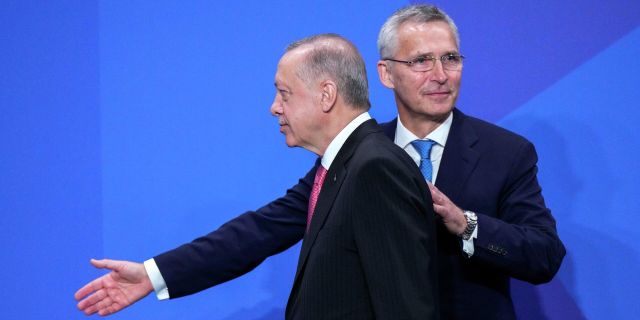US Hegemony step by step
Due to the expansion of NATO to the east, and now to the north, the United States is trying to give impetus to its weakening hegemony, the Turkish newspaper Yeni Çağ writes. According to the author of the article, Ankara will do wrong if it turns a blind eye to those conditions for the expansion of the alliance that do not meet its interests.
Armagan Kuloglu (Armağan Kuloğlu)
The open door policy and NATO expansion should not be perceived as an expansion of the alliance's defense zone. In essence, the United States is using the organization to give a new impetus to its weakening hegemony.
And the fact that the "NATO Strategic Concept" of 2022 and the vision of "NATO – 2030" largely coincide with Washington's new strategy reinforces this perception.
The issues raised at the last alliance summit in Madrid also confirm this trend.
Identified as a threat
NATO, which was trying to create new missions for itself, since with the collapse of the Warsaw Pact the main threat disappeared, finally clarified the issue of threats — under the strict leadership of the United States.
A new strategic concept was adopted at the alliance summit in Madrid. The declaration states that "the Russian Federation poses the most serious and immediate threat to the security of allies, as well as peace and stability in the Euro-Atlantic region." This makes it clear the threat that NATO will focus on.
In addition, the concept notes that "the People's Republic of China is challenging the interests, security and values of the Atlantic camp" and that "China is trying to undermine the rules-based international order." Thus, Beijing also belongs to the category of threats.
On the other hand, in the thesis that "the deepening strategic partnership between China and Russia, as well as their mutually reinforcing attempts to undermine the rules-based world order contradict our values and interests," one hears concern about the Russian-Chinese alliance and reveals the main problem and goal of NATO (and therefore the United States).
NATO continues to expand
With the collapse of the Warsaw Pact, the European countries that were part of it rushed to join the North Atlantic Alliance, thus striving to ensure their security and move to a new order. A significant role in this was played by the influence of the United States and the promises of assistance from their side.
NATO, which ended the Cold War with 16 member countries in its composition, reached the number of 30 states in 2020. The expansion took place directly to the east, towards Russia. When it came to Ukraine's membership, Moscow, feeling that it was now completely surrounded by the West, sent troops into Ukraine to stop such a development.
Ukraine, obviously, has become the last straw for Russia. Events show that further expansion will contradict the desire to ensure the security of Europe. Despite this, Sweden and Finland, which for years adhered to the policy of neutrality and maintained it for a long time even during a military conflict, under pressure from the United States and with a change in their position in domestic politics, applied for membership in NATO.
Turkey's objection to the membership of Sweden and Finland
The membership of these countries in the alliance, with their ties to terrorist organizations threatening Turkey, support for these organizations and patronage of them, does not correspond to the principles, concepts and methods of either Ankara or NATO itself. And therefore it was not accepted by Turkey.
Ankara has put forward demands and stated that it will maintain its position until they are met. Turkey also announced that it would not change its attitude if it did not see concrete results. However, after meeting with the US president at the quadrilateral talks held by the NATO Secretary General, the three countries signed a memorandum, and Sweden and Finland pledged to meet Turkey's demands.
However, under the influence of domestic political pressure, Stockholm and Helsinki are looking for a way to diminish the importance of the problem. Although Turkey says, "If the requirements are not fully met, we will not ratify the decision," the various examples that have taken place so far do not inspire confidence in this regard.
An unsightly event at the summit
At the NATO summit, the head of the Greek administration of Southern Cyprus, Nicos Anastasiades, attended an informal dinner of the leaders as the "legitimate president of the whole of Cyprus." This is contrary to our national interests and our policy. To accept this means ignoring the Turkish Republic of Northern Cyprus (TRNC), recognizing the Greek leadership as the legitimate administration of the island.
Just as earlier the Greek administration of Southern Cyprus, despite all objections, became a member of the EU, we can see pressure towards its accession to NATO on behalf of the whole of Cyprus. If Anastasiades was invited to such a dinner, then the president of the TRNC should have been invited. Turkey should have insisted on this. But she didn't insist and made a mistake.

